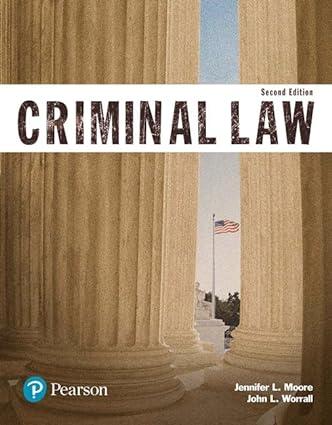Minneapolis police officers Kenneth Awalt and Christopher Humphrey responded to the scene first. Officer Awalt observed appellant
Question:
Minneapolis police officers Kenneth Awalt and Christopher Humphrey responded to the scene first. Officer Awalt observed appellant lying on the grass on the corner of Portland and 24th. Appellant was not wearing a shirt and his pants were down around his thigh area. Appellant got up off the ground and was shaking his arms, ranting and raving, and “saying biblical homages.” Appellant refused to comply with the officers’ orders to get down on the ground . . . Officer Werner observed the other officers attempt to mace appellant to no avail. Appellant wandered onto Portland Avenue into traffic. Officer Werner subsequently tased appellant.
Appellant, still struggling and speaking incomprehensibly, was loaded into an ambulance. Inside the ambulance, a paramedic observed appellant “spitting and turning his head a lot.” Next to the side of appellant’s mouth, she saw a baggie containing a substance she believed to be crack cocaine.
The substance was later identified as crack cocaine. Appellant was charged with first-degree aggravated robbery in violation of Minn. Stat. § 609.245, subd. 1. Prior to trial, defense counsel gave notice of appellant’s intent to rely upon the defenses of “Mental Illness or Deficiency” and “Intoxication.”. . On May 5, 2008, defense counsel proffered to the Court that the drug-induced psychosis from which Defendant was suffering at the time of the offense was caused by involuntary intoxication. Specifically, defense counsel proffered that in addition to the Defendant’s use of cocaine during the days leading up to the date of offense; the Defendant also smoked marijuana which, the Defendant believes, was “laced” with an unknown substance. According to defense counsel, the Defendant will assert at trial that the psychosis from which he was suffering at the time of the crime was caused by an unanticipated reaction to the drugs he ingested.
. . . Generally, when a defendant relies upon the use of alcohol or drugs as a defense, “mental illness caused by voluntary intoxication is not a defense.” Appellant asserts, however, that he was involuntarily intoxicated at the time of the offenses because, unbeknownst to him, the marijuana he smoked was laced with phencyclidine (PCP). In order to prevail in asserting the defense of involuntary intoxication, appellant must show that: (1) he “was unaware that because of a particular susceptibility to it the substance would have a grossly excessive intoxicating effect” or “was innocently mistaken as to the nature of the substance taken”; (2) the “intoxication was caused by the intoxicating substance in question and not by some other intoxicant”; and (3) he was temporarily mentally ill at the time of the offenses.
. . . [W]e do not believe that the defense of involuntary intoxication is available to appellant under the facts of this case. We initially observe that marijuana is a controlled substance in Minnesota. Additionally, we agree with the California appellate court’s observation in People v. Velez that [i]t is common knowledge that unlawful street drugs do not come with warranties of purity or quality associated with lawfully acquired drugs such as alcohol. Thus, unlike alcohol, unlawful street drugs are frequently not the substance they purport to be or are contaminated with other substances not apparent to the naked eye.
Questions
1. What is McClenton’s main argument for asserting the defense of intoxication?
2. Which defense is more appropriate for McClenton, voluntary or involuntary intoxication?
3. Was it fair for McClenton to assume that the illegal drugs he purchased were “pure”? Why or why not?
Step by Step Answer:






